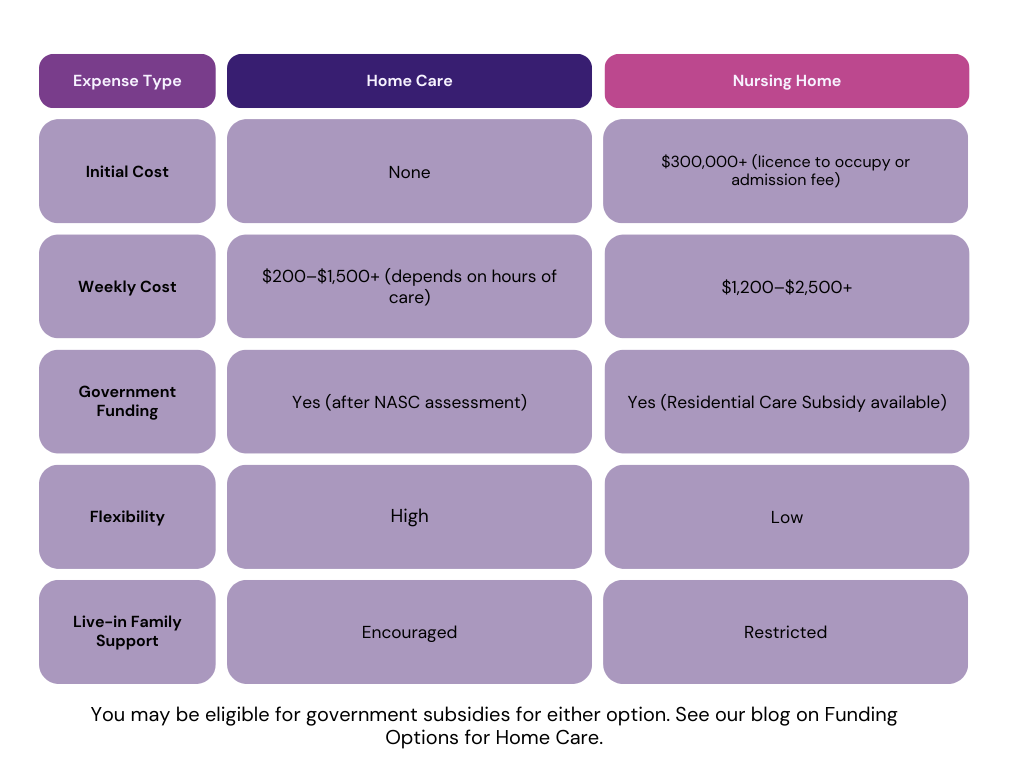As our parents grow older, one of the most difficult decisions we face is how best to support them as their needs increase. For many families in New Zealand, the choice comes down to home care or a nursing home. Both options offer important benefits—but they’re designed for very different needs, preferences, and lifestyles.
So, how do you know which is right for your parent? In this guide, we’ll explore the key differences, pros and cons, and questions to ask when making this critical decision.
What is Home Care?

Home care provides professional support services delivered in the comfort of your parent’s own home. It’s ideal for older adults who want to stay independent but need some help with daily tasks.
Common Home Care Services Include:
- Personal care (e.g., showering, grooming, toileting)
- Housekeeping and meal preparation
- Medication reminders
- Companionship
- Mobility support
- Overnight or 24-hour care
Key Advantages of Home Care
✅ Remain in familiar surroundings
✅ Highly personalised and flexible
✅ One-on-one attention from a carer
✅ Encourages independence and dignity
✅ Family involvement is easier
What is a Nursing Home?

A nursing home (also called a residential care facility) is a facility where older adults live full-time and receive around-the-clock care from trained staff.
Common Nursing Home Services Include:
- 24/7 supervision and medical care
- Meals, laundry, and housekeeping
- Social activities and group programmes
- On-site access to healthcare professionals
Key Advantages of Nursing Homes
✅ Suitable for those with high medical needs
✅ Supervised environment 24/7
✅ Social opportunities with other residents
✅ No responsibility for maintaining a home
Cost Comparison: Home Care vs. Nursing Homes

When Home Care is the Better Option
Home care may be best when your parent:
- Is still relatively independent
- Prefers the comfort and familiarity of their own home
- Has a strong support system (e.g., family nearby)
- Needs flexible, part-time or occasional help
- Is emotionally or socially attached to their current living environment
Example:
Your mum lives alone, but she’s struggling with mobility and cooking. She still enjoys her garden and her neighbours drop in regularly. A carer visiting three times a week could provide help with meals, housekeeping, and personal care—while keeping her in the environment she loves.
When a Nursing Home May Be Necessary

Nursing homes are often more suitable when your parent:
- Requires 24-hour supervision
- Has complex or high-level medical needs (e.g., dementia, stroke recovery)
- Is unsafe living alone due to frequent falls or wandering
- Lacks local family or community support
- Needs care beyond what home services can provide
Example:
Your father has advanced dementia, is forgetting to eat, and is prone to wandering outside. A secure nursing home environment with 24-hour supervision may better meet his current needs.
Questions to Help You Decide
Ask yourself these questions when weighing your options:
- Is my parent able to perform daily activities like cooking, bathing, and dressing?
- Are there safety concerns (e.g., falls, medication errors)?
- Does my parent have medical needs that require constant monitoring?
- Are they becoming isolated or withdrawn?
- Would they benefit more from one-on-one attention or a group care environment?
- What does my parent want—and how can we best honour that?
Blending Both: Transitional or Hybrid Care

It’s not always one or the other. Many families start with home care and transition to a nursing home as needs evolve. Others use respite or temporary home care following a hospital stay before considering full-time residential care.
There’s also the option of care in a retirement village, which offers independent living with access to care services as required.
Read our guide on Home Care vs. Retirement Villages for more details.
Final Thoughts: Choose What’s Right for Your Parent
Ultimately, the decision between home care and a nursing home depends on your parent’s health, preferences, financial situation, and the support network around them. What works for one family may not suit another—and that’s okay.
Starting the conversation early and staying informed are key. Whether you’re leaning toward home care, a nursing facility, or a mix of both, the most important thing is ensuring your parent feels safe, supported, and respected.
âž¡ Need help exploring care options? Call us today for a friendly, no-pressure chat about what might work best for your family.
